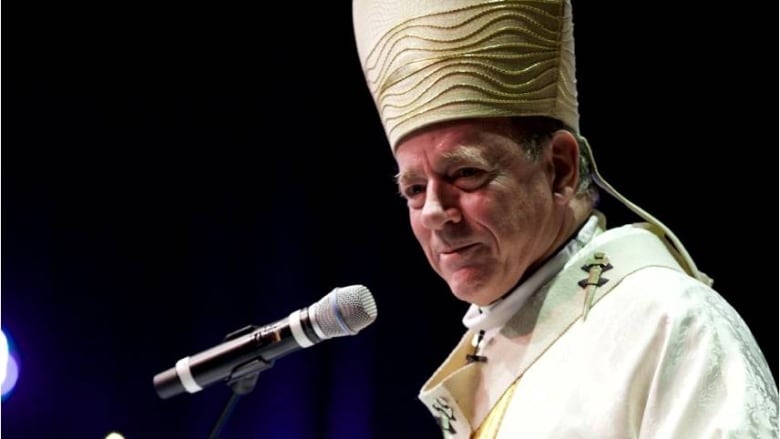Vancouver Catholic Archbishop apologizes to Indigenous communities for church's role in residential schools
Apology follows calls from many Catholics for more accountability from their church

WARNING: This story contains details some readers may find distressing.
Vancouver Archbishop J. Michael Miller has issued a formal apology to First Nations in the wake of preliminary findings from a radar survey of the former Kamloops Indian Residential school that indicated that as many as 215 children could be buried on the site.
"I am writing to express my deep apology and profound condolences to the families and communities that have been devastated by this horrific news," Miller said in a statement Wednesday.
"Each time new evidence of a tragedy is revealed, or another victim comes forward, countless wounds are reopened, and I know that you experience renewed suffering."
In the statement, Miller said he reflected on an earlier apology he made in 2013 before the Truth and Reconciliation Commission, which he described as "words to which I remain committed and accountable."
WATCH | Catholics are seeking accountability from their church:
He also said the archdiocese is committed to providing the archives and records related to all residential schools and urged other Catholic and government organizations to do the same.
He said the archdiocese has already provided records related to the former residential school in Kamloops to the Truth and Reconciliation Commission and promised they would remain available for review.
Pledges support
In addition to promising full transparency, Miller offered to assist the Tk'emlúps te Secwépemc and other affected First Nations with technological and professional support "to honour, retrieve and remember their deceased children."
That support, he said, would include mental health support and counselling for family members and others whose loved ones may be buried on the former residential school site.
Miller said the same offer will include all First Nations within the archdiocese's boundaries where Catholic-run residential schools were located.
In his statement, Miller said, "the Church was unquestionably wrong in implementing a government colonialist policy which resulted in devastation for children, families and communities."
He said an apology alone is not enough unless accompanied by tangible actions.
"Truth must come before reconciliation," he said.
Christians speak out
The preliminary findings from Kamloops have prompted calls from some Catholics to hold their church more accountable for its role in running the residential schools — which the federal government estimates at least 150,000 First Nation, Métis, and Inuit students were forced to attend.
Jody Garneau, whose entire family was raised Catholic, started a Facebook group for other Catholics to discuss their conflicted feelings about the church after news of the Kamloops discovery became public.

"We are the church in addition to the people who run the church, the hierarchy, and maybe we can bring some pressure or some positive influence of 'this is what we want to see in a response.'"
Garneau noted that the Canadian Council of Catholic Bishops has yet to ask the Pope to issue an official apology for residential schools even though the TRC recommended it.
Daryl Deklerk, a pastor at East Hill Community Church in Vernon, B.C., is not Catholic but said his anger and guilt as a Christian motivated him to drive to Kamloops to have conversations with Indigenous elders there.
"I really wanted to grieve," said Deklerk, who later shared photos from Kamloops with his own congregation. "I wanted them to also experience the grief of it and the anger and to have their boots on the ground."
Support is available for anyone affected by their experience at residential schools, and those who are triggered by the latest reports.
A national Indian Residential School Crisis Line has been set up to provide support for former students and those affected. People can access emotional and crisis referral services by calling the 24-hour national crisis line: 1-866-925-4419.
